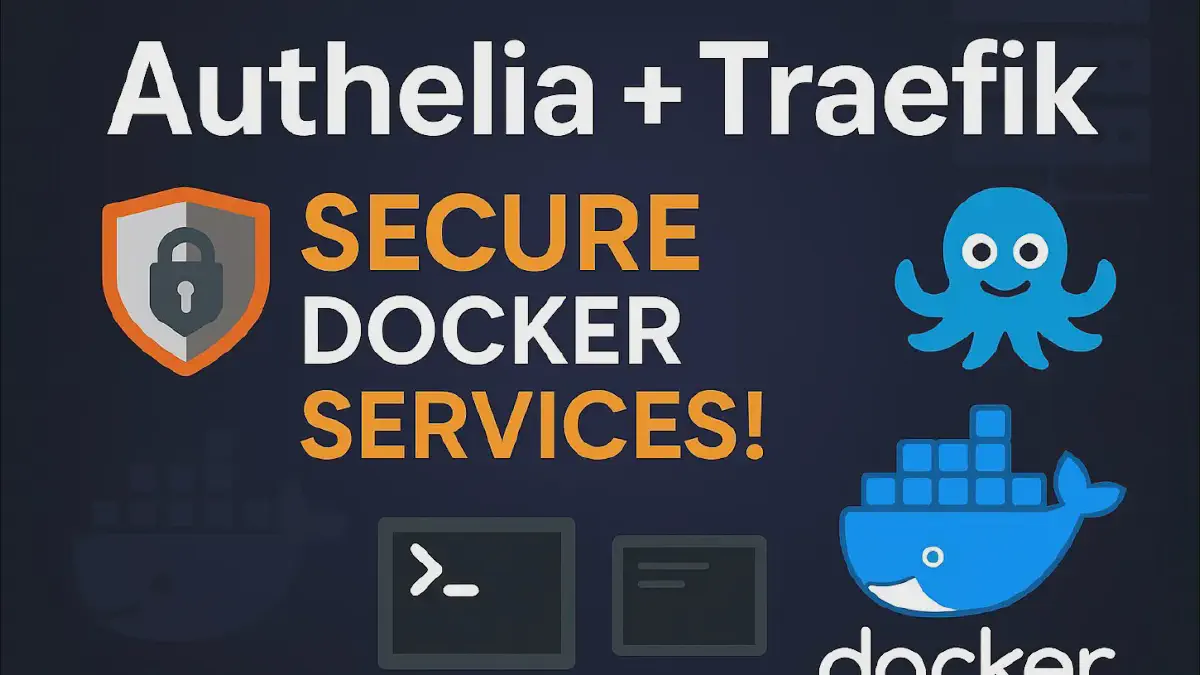Установка Authelia в Docker | Полный гайд#
Authelia — это современное решение для управления доступом и двухфакторной аутентификации, которое легко разворачивается в Docker-среде. В этом руководстве мы разберём, что такое Authelia, как его установить и чем оно отличается от других решений для SSO (Single Sign-On).
Что такое Authelia?#
Authelia — это открытая платформа для аутентификации и авторизации, предназначенная для защиты веб-приложений, развернутых за обратным прокси (например, Traefik или NGINX).
Основные функции Authelia:#
- Защита любых веб-приложений по домену или URI
- Поддержка 2FA (TOTP, Duo, WebAuthn и др.)
- Интеграция с LDAP, Active Directory, или файлами
- Совместимость с Traefik, NGINX, Caddy
- Полноценный SSO механизм
- Поддержка ACL (прав доступа на основе правил)
Чем отличается Authelia от других решений?#
| Характеристика | Authelia | Authentik | Keycloak | ZITADEL |
|---|---|---|---|---|
| Легкость установки | ⭐⭐⭐⭐ | ⭐⭐⭐ | ⭐ | ⭐⭐ |
| Поддержка 2FA | ✅ | ✅ | ✅ | ✅ |
| Поддержка SSO | ✅ | ✅ | ✅ | ✅ |
| Open Source | ✅ | ✅ | ✅ | ✅ |
| Web-интерфейс | ❌ (консоль) | ✅ | ✅ | ✅ |
| Производительность | Высокая | Средняя | Низкая | Средняя |
| Поддержка ACL | ✅ | ✅ | Ограничено | ❌ |
Authelia — отличный выбор для тех, кто хочет максимальную безопасность при минимуме ресурсов, особенно в self-hosted среде.
Предварительные требования#
Перед установкой убедитесь, что у вас есть:
- Docker и Docker Compose
- Обратный прокси (например, Traefik)
- Настроенные домены и HTTPS (например, через Let’s Encrypt)
- Базовые знания работы с YAML и Docker
Примерная структура проекта#
authelia/
├── configuration.yml
├── users.yml
├── docker-compose.yml
└── secrets
services:
authelia:
image: "authelia/authelia"
container_name: "authelia"
volumes:
- "./secrets:/secrets:ro"
- "./config:/config"
- "./logs:/var/log/authelia/"
networks:
proxy:
labels:
- "traefik.enable=true"
- "traefik.http.routers.authelia.rule=Host(`authelia.domain.ru`)"
- "traefik.http.routers.authelia.entrypoints=https"
- "traefik.http.routers.authelia.tls=true"
- "traefik.http.middlewares.authelia.forwardAuth.address=http://authelia:9091/api/verify?rd=https://authelia.stilicho.ru"
- "traefik.http.middlewares.authelia.forwardAuth.trustForwardHeader=true"
- "traefik.http.middlewares.authelia.forwardAuth.authResponseHeaders=Remote-User,Remote-Groups,Remote-Name,Remote-Email"
- "traefik.http.services.authelia.loadbalancer.server.port=9091"
environment:
TZ: "Europe/Moscow"
AUTHELIA_IDENTITY_VALIDATION_RESET_PASSWORD_JWT_SECRET_FILE: "/secrets/JWT_SECRET" # tr -cd '[:alnum:]' < /dev/urandom | fold -w 64 | head -n 1 > ./secrets/JWT_SECRET
AUTHELIA_SESSION_SECRET_FILE: "/secrets/SESSION_SECRET" # tr -cd '[:alnum:]' < /dev/urandom | fold -w 64 | head -n 1 > ./secrets/SESSION_SECRET
AUTHELIA_STORAGE_ENCRYPTION_KEY_FILE: "/secrets/STORAGE_ENCRYPTION_KEY" # tr -cd '[:alnum:]' < /dev/urandom | fold -w 64 | head -n 1 > ./secrets/STORAGE_ENCRYPTION_KEY
#whoami-secure:
# image: "traefik/whoami"
# restart: "unless-stopped"
# container_name: "whoami-secure"
# labels:
# - "traefik.enable=true"
# - "traefik.http.routers.whoami-secure.rule=Host(`whoami-secure.stilicho.ru`)"
# - "traefik.http.routers.whoami-secure.entrypoints=https"
# - "traefik.http.routers.whoami-secure.middlewares=authelia@docker"
# networks:
# proxy:
networks:
proxy:
external: true
users:
stilicho: ## Username
displayname: "stilicho"
## WARNING: This is a default password for testing only!
## IMPORTANT: Change this password before deploying to production!
## Generate a new hash using the instructions at:
## https://www.authelia.com/reference/guides/passwords/#passwords
## Password is 'authelia'
password: "$argon2id$v=19$m=65536,t=3,p=4$uSPUUUh/a5U7pNso6g2cMA$YJECeQHkv/qXZDB3W9ADkWj7DMSJRWcn/pVHTUvCbtI"
email: "authelia@authelia.com"
groups:
- "admin"
- "dev"
server:
address: tcp://0.0.0.0:9091/
log:
level: debug
theme: dark
# This secret can also be set using the env variables AUTHELIA_JWT_SECRET_FILE
#jwt_secret:
default_redirection_url: https://authelia.stilicho.ru
totp:
issuer: authelia.com
# duo_api:
# hostname: api-123456789.example.com
# integration_key: ABCDEF
# # This secret can also be set using the env variables AUTHELIA_DUO_API_SECRET_KEY_FILE
# secret_key: 1234567890abcdefghifjkl
authentication_backend:
file:
path: /config/users.yml
password:
algorithm: argon2
# Recommended Parameters
# Uses 2 GiB memory, then immediately releases it.
# See https://www.authelia.com/reference/guides/passwords/#recommended-parameters-argon2
# See https://www.rfc-editor.org/rfc/rfc9106.html#section-4 for details on tuning the parameters for your hardware.
# After saving configuration file, password hash can be generated by running: docker run -v ./configuration.yml:/configuration.yml --rm authelia/authelia:latest authelia crypto hash generate --config /configuration.yml --password 'yourpassword'
argon2:
variant: argon2id
iterations: 1
memory: 2097152
parallelism: 4
key_length: 32
salt_length: 16
# Recommended Parameters when constrained by low memory or low powered hardware. Uses 64 KiB memory, then immediately releases it.
# argon2:
# variant: argon2id
# iterations: 3
# memory: 65536
# parallelism: 4
# key_length: 32
# salt_length: 16
access_control:
default_policy: deny
rules:
# Rules applied to everyone
- domain: traefik-dashboard.stilicho.ru
policy: two_factor
#- domain: portainer.stilicho.ru #для portainer есть oidc
# policy: two_factor
- domain: nginx.stilicho.ru
policy: two_factor
session:
name: authelia_session
# This secret can also be set using the env variables AUTHELIA_SESSION_SECRET_FILE
#secret:
expiration: 14400 # 4 hour
inactivity: 14400 # 4 hour
domain: stilicho.ru # Should match whatever your root protected domain is
# redis:
# host: redis
# port: 6379
# # This secret can also be set using the env variables AUTHELIA_SESSION_REDIS_PASSWORD_FILE
# # password: authelia
regulation:
max_retries: 3
find_time: 120
ban_time: 300
storage:
#encryption_key: /secrets/STORAGE_ENCRYPTION_KEY # Now required
local:
path: /config/db.sqlite3
#password_policy:
# zxcvbn:
# enabled: true
# min_score: 4
#identity_providers:
# oidc:
## The other portions of the mandatory OpenID Connect 1.0 configuration go here.
## See: https://www.authelia.com/c/oidc
# clients:
# - client_id: 'portainer'
# client_name: 'Portainer'
# client_secret: '$pbkdf2-sha512$310000$c8p78n7pUMln0jzvd4aK4Q$JNRBzwAo0ek5qKn50cFzzvE9RXV88h1wJn5KGiHrD0YKtZaR/nCb2CJPOsKaPK0hjf.9yHxzQGZziziccp6Yng' # The digest of 'insecure_secret'.
# public: false
# authorization_policy: 'two_factor'
# require_pkce: false
# pkce_challenge_method: ''
# redirect_uris:
# - 'https://portainer.stilicho.ru'
# scopes:
# - 'openid'
# - 'profile'
# - 'groups'
# - 'email'
# response_types:
# - 'code'
# grant_types:
# - 'authorization_code'
# access_token_signed_response_alg: 'none'
# userinfo_signed_response_alg: 'none'
# token_endpoint_auth_method: 'client_secret_post'
#log:
# level: info
# format: text
# file_path: /logs/authelia.log
# keep_stdout: false
notifier:
# smtp:
# username: test
# # This secret can also be set using the env variables AUTHELIA_NOTIFIER_SMTP_PASSWORD_FILE
# password: password
# host: mail.example.com
# port: 25
# sender: admin@example.com
filesystem:
filename: /config/notification.txt

